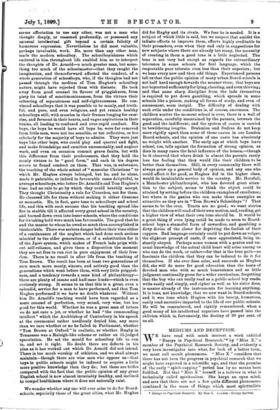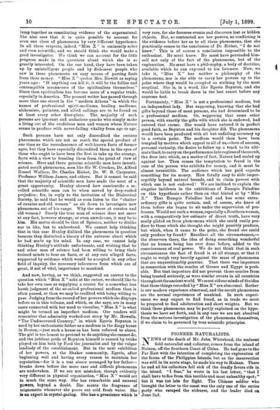MEDIUMS AND DECEPTION.
WE have read with much interest a work entitled "Essays in Psychical Research,"* by "Miss X," a member of the Psychical Research Society, and evidently a. very keen investigator into what, for lack of a better term, we must call occult phenomena. "Miss X " considers that there has not been the progress in psychical research that we might have expected in a scientific age, and that the promise of the early "spirit-rapping " period has by no means been fulfilled. Not that "Miss X" herself is a believer in what is technically called spiritualism. She keeps an open mind, and sees that there are nut a few quite different phenomena combined in the mass of things which most epiritnaliste • Essays in Psychical Research. By ?dim X. London : George Red Way. lump together as constituting evidence of the supernatural. She also sees that it is quite possible to account for even one class of phenomena by very different hypotheses. In all these respects, indeed, "Miss X" is eminently sober and even scientific, and we should think she would make a good investigator. We think we can account for the little progress made in the questions about which she is so greatly interested. On the one hand, they have been taken up by unintelligent people and by dishonest people who saw in these phenomena an easy means of parting fools from their money. "Miss X quotes Mrs. Howitt as saying years ago : "If anything can kill it, it will be the follies and contemptible meannesses of the spiritualists themselves." Since then spiritualism has become more of a regular trade, especially in America. The present writer has passed through more than one street in the "modern Athens" in which the names of professional spirit-mediums, healing mediums, alchemists, palmists, and allied callings are to be found on at least every other door-plate. The majority of such persons are ignorant and audacious quacks who simply make a living out of the credulous men and women whom Nature seems to produce with never-failing vitality from age to age.
Such persons have not only discredited the curious phenomena which are not so much the special product of our time as the recrudescence of well-known facts of former ages, but they have especially discredited them in the eyes of those who ought to have been the first to take up the strange facts with a view to treating them from the point of view of science. Here and there genuine scientific men have investi- gated occult phenomena, men like Sir W. Crookes, Dr. Alfred Russel Wallace, Dr. Charles Richet, Dr. W. B. Carpenter, Professor William James, and others. But it cannot be said that the majority of scientific men have made the most of a great opportunity. Huxley showed how unscientific a so- called scientific man can be when moved by deep-rooted prejudice ; for, in reply to the invitation of the Dialectical Society, he said that he would as soon listen to the "chatter of curates and old women" as sit down to investigate new phenomena out of his range. Why the sneer at curates and old women ? Surely the true man of science does not sneer at any fact, however strange, or even unwelcome, it may be to him. His motto should be that of Spinoza, neither to dislike nor to like, but to understand. We cannot help thinking that in this case Huxley disliked the phenomena in question because they disturbed a theory of the universe about which he had made up his mind. In any case, we cannot help thinking Huxley's attitude unfortunate, and wishing that he and other men of science had been willing to bring their trained minds to bear on facts, or at any rate alleged facts, supported by evidence which would be accepted in any other field of inquiry, the necessary inferences from which are of great, if not of vital, importance to mankind.
And now, having, as we think, suggested an answer to the question which "Miss X "asks at the outset, we should like to take her own case as supplying a reason for a somewhat less harsh judgment of the so-called professional medium than is often passed, or than we may be credited with being willing to pass. Judging from the record of her powers which she displays before us in this volume, and which, as she says, are in many cases connected with her need to visualise, "Miss X" is what might be termed an imperfect medium. Our readers will remember that admirably worked-out story by Mr. Howells, "The Undiscovered Country," in which Egeria Boynton is used by her enthusiastic father as a medium in the dingy house in Boston,—just such a house as has been referred to above. The girl is too honest to pretend to do anything she cannot do, and the jubilant pride of Boynton himself is caused by tricks played on him both by Ford the journalist and by the vulgar landlady of the establishment. But in the next exhibition of her powers, at the Shaker community, Egeria, after beginning well and having every reason to maintain her reputation—for it is a test séance arranged by her father— breaks down before the more rare and difficult phenomena are undertaken. If we are not mistaken, though evidently very different in physical organisation, "Miss X" would act in much the same way. She has remarkable and unusual powers, beyond a doubt. She scents the fragrance of mignonette whenever she pours out cold fresh water. She is an expert in crystal-gazing. She has a prescience which is very rare, for she foresees events and discovers lost or hidden objects. But, so contracted are her powers, so conflicting is the evidence before her as to all these phenomena, that she practically comes to the conclusion of Dr. Richet, "I do not know." This is of course a conclusion impossible to the enthusiast. He must know. He must have persuaded him- self not only of the fact of the phenomena, but of the explanation. He must have a philosophy, a body of doctrine, available which he can expound to his listeners. Now, we take it, "Miss X" has neither a philosophy of the phenomena, nor is she able to carry her powers up to the point where they would be accepted as striking by the most sceptical. She is, in a word, like Egeria Boynton, and she would be liable to break down in the last resort before any supreme teat.
Fortunately, "Miss X" is not a professional medium, but an independent lady. But supposing, knowing that she had gifts beyond those of most persons, she had determined to be a professional medium. Or, supposing that some other person, with exactly the gifts with which she is endowed, had entered that career. She would have entered it in perfect good faith, as Boynton and his daughter did. The phenomena would have been produced with all but unfailing accuracy up to a certain point. The medium would then have been tempted by motives which appeal to all of us,—love of success, personal curiosity, the desire to follow up a track to its ulti- mate limit, to carry on the performance into regions of the occult, the door into which, as a matter of fact, Nature had sealed up against her. Then comes the temptation to fraud in the case of the person who exhibits for money, and it must be almost irresistible. The audience which has paid expects something for its money. How fatally easy to slide imper- ceptibly beyond natural bounds, and to claim powers with which one is not endowed ! We are inclined to explain the singular incidents in the exhibitions of Ensapia Paladino on this hypothesis rather then on that hinted at by "Miss X." That Easapia Paladino had and has some extra- ordinary gifts is quite certain, and, of course, she knew of them before she began to sit under the supervision of pro- fessors. Would not such a woman, especially a Southern woman, with a comparatively low estimate of direct truth, have very easily glided on from phenomena which she could really pro- duce to those which she thought she might possibly produce, but which, when it came to the point, she found she could only produce by fraud ? Recollect all the circumstances,— the observers there, the idea of doing something wonderful that no human being has ever done before, added to the consciousness of real power. We do not think that in such circumstances the fact of fraud is at all strange, or that it ought to weigh very heavily against the mass of phenomena that are unquestionably genuine. That there was imposture in connection with the oracles of Greece and Egypt is prob- able. But that imposture did not prevent those oracles from being treated seriously, as were similar events in all countries throughout the ancient world. We must rid our minds of the idea that these things recorded by "Miss X" are abnormal. Rather is our modern experience abnormal, and the occult phenomena
are the normal experiences of mankind. In such experi- ences we may expect to find fraud, as in trade we must be prepared to find adulteration and short weights. But we think these phenomena may be partly explained on the hypo- thesis we have set forth, and in any case we are not absolved from the serious investigation of the phenomena themselves, if we claim to be governed by true scientific principles.
















































 Previous page
Previous page